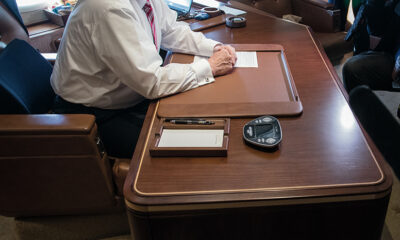Constitution
A July 4th Address for the Ages

Two years before he formulated the ideas for the Monroe Doctrine, then-Secretary of State John Quincy Adams was asked to give the annual Independence Day address in the United States Capitol. It became what historian Samuel Flagg Bemis called a landmark document in the history of American foreign policy. Its message continues to resonate in modern debates about U.S. foreign policy.
Life of John Quincy Adams to that moment
Before getting into the details of Adams’ address, some background about Adams and 1821 (the year he delivered the speech) is necessary. John Quincy Adams was the son of John Adams, one of the driving forces behind America’s independence and the nation’s second president. Young John Quincy accompanied his father in diplomatic posts in France, and later served as private secretary to Francis Dana in Russia. Young Adams also had served as his father’s private secretary during the negotiations of the Treaty of Paris (1783) that ended the War of Independence. He was appointed by President George Washington as U.S. Minister Resident to the Netherlands in 1794. He served in that same position in Prussia during his father’s presidency.
President Madison named John Quincy U.S. Minister to Russia in 1809, and he served in that position until 1814, as the Napoleonic Wars were coming to a close. He chaired the U.S. delegation that negotiated the Treaty of Ghent which ended the War of 1812 with Great Britain, and later served as U.S. Minister to Great Britain in the aftermath of Napoleon’s defeat at Waterloo. President James Monroe appointed John Quincy as Secretary of State. In 1824, Adams won the disputed presidential election in the House of Representatives, where he bested military hero Andrew Jackson. (Jackson would later claim that Adams won the presidency in a “corrupt bargain” with Henry Clay, whom Adams appointed as Secretary of State).
The July 4th address
The historical background to his July 4th oration included revolutions in South America and Central and Eastern Europe, including Greece. There was much sentiment in the United States for providing support to what were thought of as democratic revolutions similar to our own War of Independence. Advocates of American intervention in other countries included such prominent statesmen as Henry Clay and Daniel Webster.
John Quincy Adams had seen this before, when during the Washington administration influential figures such as Secretary of State Thomas Jefferson urged U.S. support for revolutionary France in its wars with Great Britain. Adams observed the skillful diplomacy of President Washington and Treasury Secretary Alexander Hamilton in declaring neutrality in the European wars. Adams also agreed with President Washington’s sentiments expressed in his Farewell Address, especially Washington’s counsel to avoid permanent alliances and to base American foreign policy on interests instead of sentiment.
In his brief July 4, 1821 address, Adams acknowledged America’s example of “the inexstinguishable rights of human nature,” the lawful foundations” of America’s government, and “liberty, equal justice and . . . equal rights.” The principles of the Declaration of Independence, however, should not impact America’s relations with other powers. He then set forth what has become almost the bible of foreign policy realism. America, he said,
has . . . without a single exception, respected the independence of other nations while asserting and maintaining her own. She has abstained from interference in the concerns of others, even when conflict has been for principles to which she clings, as to the last vital drop that visits the heart. She has seen that probably for centuries to come, all the contests of that . . . European world, will be contests of inveterate power and emerging right. Wherever the standard of freedom and Independence has been or shall be unfurled, there will her heart, her benedictions and her prayers be. But she goes not abroad in search of monsters to destroy. She is the well-wisher to the freedom and independence of all. She is the champion and vindicator only of her own. She will commend the general cause by the countenance of her voice, and the benignant sympathy of her example. She well knows that by once enlisting under other banners than her own, were they even banners of foreign independence, would involve herself beyond the power of extrication, in all the wars of interest and intrigue, of individual avarice, envy, and ambition, which assume the colors and usurp the standard of freedom. The fundamental maxims of her policy would insensibly change from liberty to force. She might become the dictatress of the world. She would be no longer the ruler of her own spirit. America’s glory is not dominion, but liberty. Her march is the march of the mind. She has a spear and a shield: but the motto upon her shield is, Freedom, Independence, Peace. This has been Her Declaration: this has been . . . her practice.
Return to this counsel
Each time the United States has strayed from this wise counsel, we have met with tragedy and usually failure. The most recent examples are the interventions in the Balkans in the 1990s, and Iraq, Afghanistan, Libya (and the whole Arab Spring) in the 21st century, where we went abroad to destroy monsters and suffered from endless wars, tragedy, and failed foreign policies. We appear to be making the same mistakes in Ukraine, where our intervention (and NATO’s) will not produce a Ukrainian victory but may lead to a much wider and much deadlier European War.
This 4th of July as we celebrate our independence, we should reflect not only on the Declaration of Independence but also on the wise and prudent counsel uttered by John Quincy Adams more than 100 years ago.
This article was originally published by RealClearDefense and made available via RealClearWire.
Francis P. Sempa writes on foreign policy and geopolitics. His Best Defense columns appear at the beginning of each month.
-

 Accountability2 days ago
Accountability2 days agoWaste of the Day: Principal Bought Lobster with School Funds
-

 Constitution2 days ago
Constitution2 days agoTrump, Canada, and the Constitutional Problem Beneath the Bridge
-

 Executive23 hours ago
Executive23 hours agoHow Relaxed COVID-Era Rules Fueled Minnesota’s Biggest Scam
-

 Civilization22 hours ago
Civilization22 hours agoThe End of Purple States and Competitive Districts
-

 Civilization4 days ago
Civilization4 days agoThe devil is in the details
-

 Executive4 days ago
Executive4 days agoTwo New Books Bash Covid Failures
-

 Civilization4 days ago
Civilization4 days agoThe Conundrum of President Donald J. Trump
-

 Executive4 days ago
Executive4 days agoThe Israeli Lesson Democrats Ignore at Their Peril









